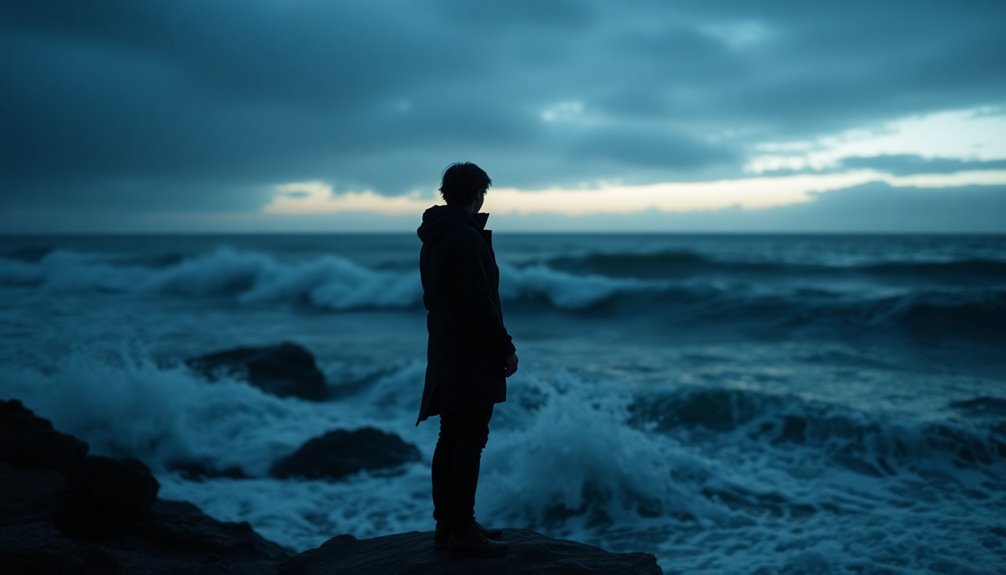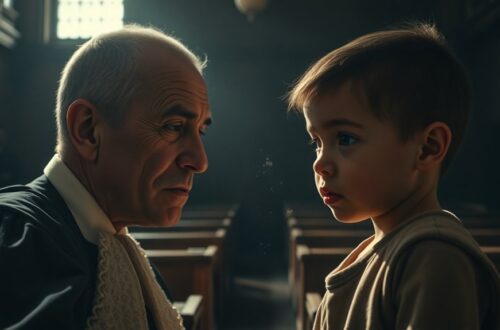John Banville's 'The Sea' immerses you in the haunting experience of grief through Max Morden's eyes. As a widower, he reflects on his loss, weaving together childhood memories and present sorrow in the coastal town of Ballyless. The narrative's non-linear approach captures the fragility of identity and the complexities of human connection. You'll encounter vivid imagery and intimate portrayals that evoke nostalgia and melancholy, symbolizing life's beauty and unpredictability. Max's journey invites you to contemplate how grief shapes reality. Discovering more about this poignant exploration of memory and loss can deepen your understanding of Banville's artistry.
Overview of "The Sea"
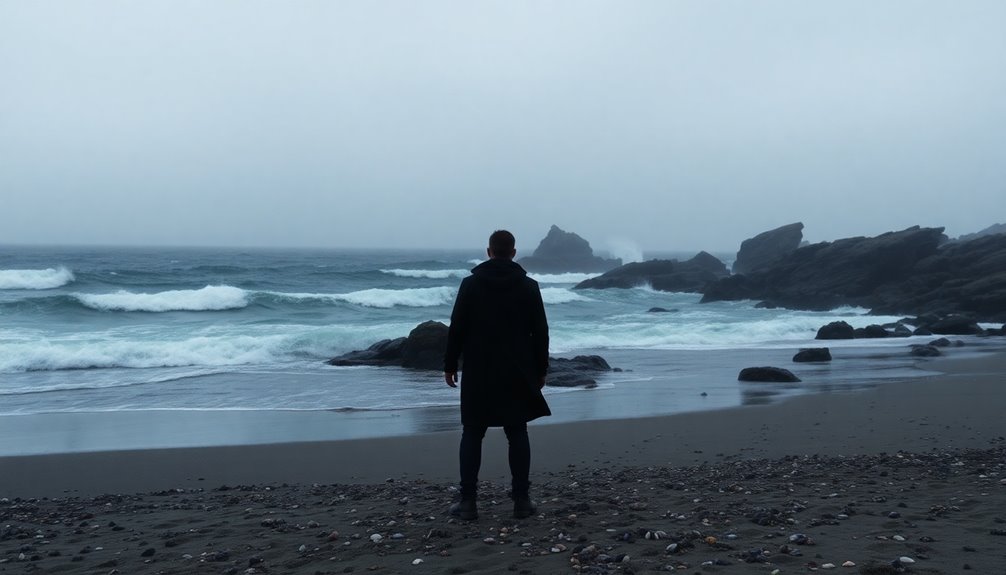
In "The Sea," John Banville crafts a poignant narrative that explores the intertwined themes of memory and loss. You step into the world of Max Morden, a grieving widower who reflects on his life as he grapples with the recent death of his wife, Anna.
As Max revisits the seaside town of Ballyless, you witness his struggle with grief and his quest for identity. The narrative unfolds in a non-linear fashion, weaving together present sorrow and vivid flashbacks to his childhood summers spent with the Grace family. Creative expression serves as a vital means of processing his emotions as he navigates this complex journey. The themes of personal growth resonate throughout the narrative, mirroring the resilience found in Dickens' characters.
Banville's lyrical writing style captures the essence of nostalgia while highlighting the unpredictable nature of memory. The seaside setting acts as a powerful backdrop, symbolizing both the beauty and fragility of life.
Through Max's eyes, you explore the complexities of human relationships, the impact of loss, and the way memories shape our identities. As you immerse yourself in this literary masterpiece, you find Banville's exploration of grief and memory resonates deeply, inviting you to reflect on your own experiences of love and loss. Additionally, the themes of healing and empowerment in literature echo the importance of finding strength through shared narratives, as seen in the resilience of survivors.
"The Sea" is an evocative journey that lingers long after the final page is turned.
Themes of Grief and Memory
Grief and memory intertwine seamlessly in "The Sea," driving Max Morden's journey through loss. As he grapples with the profound grief of losing his wife, Anna, you watch him reflect on the haunting nature of memory. His contemplations reveal the fragility of identity, especially in the face of what he refers to as a "second death," where memories fade and become elusive. This mirrors Pip's quest for identity in "Great Expectations," where he navigates the complexities of social class and personal growth.
This introspective journey highlights how the passage of time alters one's understanding of love and loss. Max's recollections of childhood summers with the Grace family evoke a deep sense of nostalgia, blending joy with melancholy. These memories shape his current emotions and relationships, reminding you that the past is never truly gone; it lingers, influencing the present. In a similar vein, Liesel's love for books in "The Book Thief" symbolizes hope during wartime struggles, illustrating how memories can provide solace amidst grief.
Banville skillfully emphasizes this interplay between grief and memory, showing how the sea serves as a powerful symbol—representing both the beauty of cherished moments and the dangers of confronting painful truths. The themes of generational poverty in Betty Smith's "A Tree Grows in Brooklyn" resonate similarly, illustrating how past struggles impact present identities and relationships.
In the end, the novel compels you to reflect on how grief reshapes your perception of reality, urging you to think about your own memories and the haunting echoes of loss that resonate within them.
Character Analysis of Max Morden

Max Morden's journey through grief reveals the depth of his emotional turmoil after losing Anna.
His complex relationships, especially with the Grace family, illustrate how loss shapes his identity and influences his interactions. The narrative captures the essence of true love and fragility that resonates with readers, much like the themes found in John Green's work. In moments of reflection, Morden often recalls the flavors of his past, akin to how culinary experiences can evoke deep emotions and memories, reminiscent of culinary narratives that shape one's identity.
As you explore his character, you'll see how his hypersensitivity often clashes with moments of cruelty, painting a vivid portrait of a man struggling to find connection amidst his pain. Additionally, his experiences reflect the ongoing struggle to balance love and duty within the context of his relationships, highlighting the intricate dynamics of human connection.
Max's Grief Journey
Steering the depths of loss, Max Morden embodies the complexities of grief in "The Sea." As a grieving widower, his journey unfolds through a blend of sensitivity and moments of unexpected cruelty, revealing the internal battles he faces.
You witness Max's profound sense of loss for his wife, Anna, which drives him to reflect on his identity and the memories of childhood summers spent with the Grace family. These recollections serve as a poignant backdrop, highlighting how nostalgia intertwines with pain.
Max's longing for connection often clashes with the isolating nature of his grief, which distorts his self-perception. You see him grappling with the idea of a "second death," a haunting notion that loss transcends physical absence, extending into the fading of memories and emotional ties.
As you explore Max's psyche, it becomes clear that his grief journey isn't just about mourning but also about understanding how his past shapes his present. Through his reflection, you're invited to explore the fragile balance between cherishing memories and confronting the ever-present shadow of loss.
Complexity of Relationships
Loss reshapes everything, especially how one connects with others. For Max Morden, the protagonist of "The Sea," grief isn't just a feeling; it's a lens through which he views his relationships. The death of his wife, Anna, plunges him into emotional turmoil, creating a chasm between his past and present.
You see how his longing for connection intertwines with nostalgia, as he reflects on his childhood with the Grace family. These memories reveal his once-innocent friendships, contrasting sharply with the harshness of adulthood.
Max's interactions are layered with both sensitivity and cruelty, revealing the complexity of his identity shaped by loss. His relationship with Anna, filled with deep love yet unresolved issues, becomes a haunting echo in his life.
This unresolved grief leaves him feeling isolated, unable to fully engage with those around him. Through Max, Banville illustrates how relationships can be a double-edged sword, providing comfort while simultaneously amplifying feelings of inadequacy.
Ultimately, the complexity of Max Morden's relationships underscores the profound impact of grief on our ability to forge genuine connections.
Structure and Narrative Style
Exploration of memory and time shapes the structure and narrative style of "The Sea," where the non-linear progression invites you into the protagonist's complex emotional landscape. The narrative structure alternates between Max Morden's present grief and evocative flashbacks to his childhood, creating a layered understanding of how time influences memory. This exploration of the essence of human experiences adds depth to the narrative, emphasizing the significance of personal stories.
Through first-person narration, you gain an intimate glimpse into Max's psyche, experiencing his emotional turmoil and reflections on loss firsthand. Banville's lyrical prose enhances the narrative, with rich, descriptive language that immerses you in sensory experiences. The enduring power of family relationships serves as a reminder of the connections that can help navigate grief.
The complexity of the story deepens through techniques like interior monologue and the presence of an unreliable narrator, mirroring Max's fragmented grasp on his past and present. As you navigate through Max's recollections, you begin to unravel the intricate relationship between identity and memory, leading to profound philosophical musings that linger long after reading.
The structure ultimately serves as a poignant exploration of grief's implications on self-perception, inviting you to reflect on your own understanding of loss and the passage of time. In this context, the importance of mental health is emphasized, as it plays a crucial role in processing grief and fostering resilience during challenging times.
Symbolism of the Sea
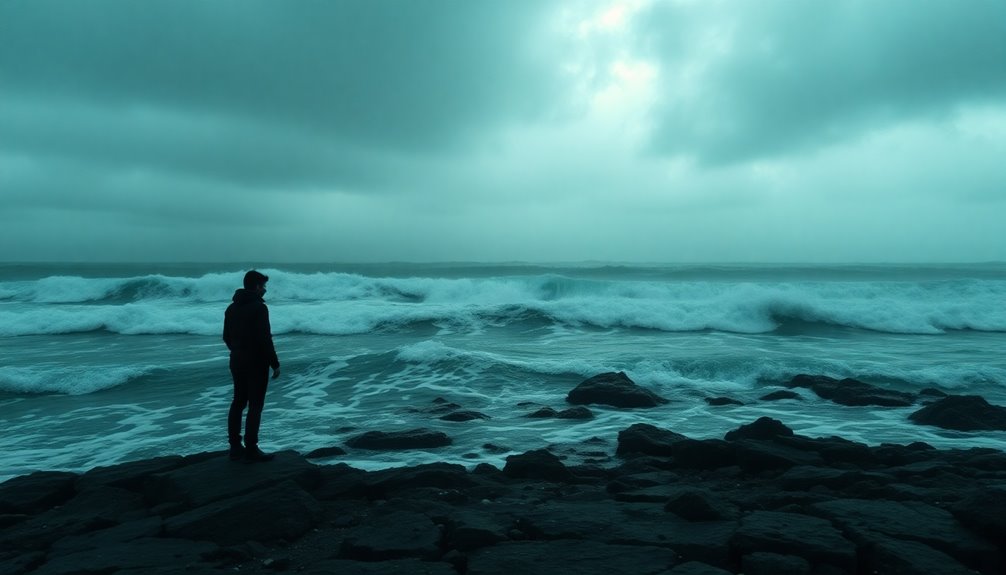
The sea in "The Sea" serves as a powerful symbol, intertwining nostalgia and danger, capturing the unpredictable nature of life. As you immerse yourself in Max Morden's reflections, you'll notice how the seaside setting of Ballyless enhances his emotional landscape of loss and introspection. The sea's fluidity mirrors his memories, evoking a complex web of feelings that define human experience. The transient nature of the tides can also serve as a reminder of the Cognitive Revolution, which fundamentally changed human consciousness and our perception of time. Furthermore, the sea embodies the struggles of individuals confronted by systemic oppression, echoing the challenges faced by characters like Bigger Thomas in Richard Wright's "Native Son."
Here are five key aspects of the sea's symbolism in the novel:
- Nostalgia: The sea evokes memories of the past, intertwining comfort and sorrow.
- Loss: It represents the void left by loved ones, a constant reminder of mortality.
- Emotions: The ebb and flow of the tide reflect human emotions, showcasing their transient nature.
- Relationships: The sea highlights the connections we forge and lose over time.
- Reflections: It serves as a backdrop for self-examination, prompting deep introspection.
Through vivid descriptions, Banville captures the essence of the sea, illustrating how it shapes Max's understanding of his life, relationships, and the haunting nature of memory. This exploration of self-discovery parallels the transformative journeys found in classic tales like "The Secret Garden."
Setting and Its Significance
In "The Sea," the seaside town of Ballyless isn't just a backdrop; it's a character in itself that shapes Max Morden's journey through grief and nostalgia.
You'll find that the vivid imagery of the sea evokes not only memories of childhood but also the complex emotions tied to loss and identity.
As you explore the interplay between setting and character, you'll see how the environment mirrors Max's internal struggles and enhances the narrative's emotional depth.
Symbolism of the Sea
Amidst the crashing waves and shifting sands, the sea in "The Sea" serves as a powerful symbol of both nostalgia and the perils of facing the past. As you explore Max Morden's journey, the sea becomes a constant reminder of his internal struggles with grief and memory. Its unpredictable nature mirrors the ebb and flow of human emotions, illustrating the complexities of loss.
Consider how the sea manifests in the narrative:
- Beauty of cherished memories: The allure of the past draws you in, wrapped in nostalgia.
- Dangers of revisiting: Each wave carries the risk of drowning in sorrow.
- Symbol of reflections: The sea amplifies Max's contemplations, shaping his self-discovery.
- Setting of The Cedars: This retreat becomes a sanctuary for memory, heavy with past relationships.
- Metaphor for life: Just like the sea, life's unpredictability can be both beautiful and treacherous.
In this way, the sea stands as a character in its own right, profoundly influencing the protagonist's journey through loss and remembrance. Its currents remind you that confronting the past can be both alluring and perilous.
Childhood Memories and Nostalgia
Reflecting on childhood memories, the seaside town of Ballyless becomes a poignant backdrop for Max Morden's journey through nostalgia and loss. This setting encapsulates the bittersweet nature of innocence, where your vivid recollections of summers at The Cedars intertwine with the grief of adulthood.
As you immerse yourself in Max's world, the sensory details evoke powerful memories, drawing you deeper into his struggles with identity and the weight of loss. The contrast between the carefree moments of Max's childhood and his current grief highlights how time reshapes memory.
Each wave that crashes upon the shore serves as a reminder of fleeting innocence, making you acutely aware of the longing that accompanies such reflections. You sense how the sea, with its unpredictable nature, mirrors the fluctuating emotions tied to nostalgia.
In this haunting landscape, Max's journey isn't just about confronting his past but about reconciling the layers of memory that define him. As you navigate through his experiences, you realize how deeply intertwined nostalgia is with the essence of grief, shaping our identities as we seek to understand the profound connections between loss and the memories that linger.
Emotional Landscape of Setting
Often, the seaside town of Ballyless emerges as a character that shapes Max Morden's emotional journey throughout "The Sea." Its landscape, marked by both beauty and danger, mirrors the tumultuous nature of his grief and memories. The sea itself serves as a powerful metaphor, embodying the unpredictability of life and the ebb and flow of human emotions.
As you explore the narrative, consider how the setting enhances themes of love, loss, and the passage of time. Here are some key elements that contribute to the emotional landscape:
- The Cedars: A seaside retreat that pulls Max back into his childhood memories.
- Sensory Descriptions: Banville's vivid imagery immerses you in Max's feelings.
- Contrast of Beauty and Danger: The coastal landscape reflects Max's internal struggles.
- Nostalgia: The setting evokes a longing for the past intertwined with present sorrow.
- Grief and Memory: The sea mirrors Max's journey through loss, shaping his emotional state.
In this way, the emotional landscape of Ballyless becomes a crucial part of your experience with Max's haunting reflection on his life.
Literary Influences and Comparisons
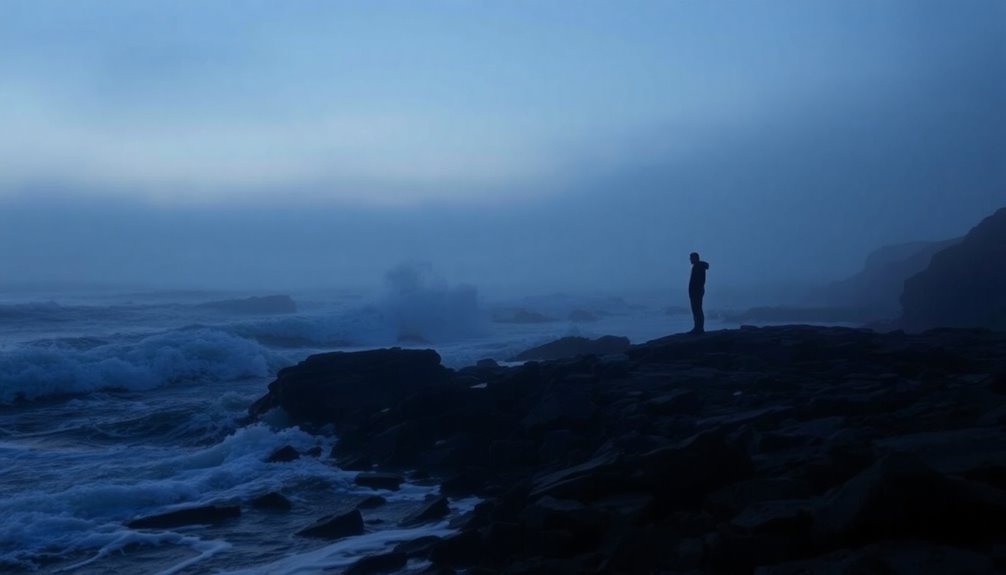
In exploring the literary influences behind John Banville's "The Sea," you can see how his style intertwines with the works of celebrated authors like Proust, Hemingway, and Nabokov. Banville's lyrical prose brings psychological depth to the narrative, allowing you to probe into the complexities of memory and its bittersweet nature.
You might notice parallels with L.P. Hartley's "The Go-Between," especially in its exploration of childhood innocence and the lasting impact of relationships.
The sea as a central motif symbolizes both beauty and danger, echoing themes found in various literary traditions. Critics often point out that while "The Sea" shows influences from Faulkner and Henry James, it manages to maintain a unique voice that sets it apart in contemporary literary fiction.
Banville's use of non-linear storytelling and interior monologue aligns with the experimental techniques of authors like Virginia Woolf and James Joyce, inviting you to question the reliability of memory.
Critical Reception and Analysis
When you look at the critical reception of "The Sea," you'll find a mix of admiration and criticism.
While some praise Banville's lyrical style and emotional depth, others see his prose as overly complex.
This dichotomy highlights not just the varied interpretations of his work, but also its connection to literary giants like Proust and Henry James.
Mixed Critical Perspectives
Steering through the mixed critical perspectives surrounding "The Sea," you'll find a landscape marked by both admiration and critique. Critics often praise Banville's lyrical style, celebrating his literary prowess and deep character exploration.
However, mixed reviews emerge, particularly regarding the plot's pacing and complexity. The novel, which won the prestigious 2005 Man Booker Prize, showcases thematic richness, but some readers feel it veers into tedious territory.
Here are some key points that capture the critical reception:
- Banville's prose is recognized for its elegance but may feel overly intricate to some.
- The exploration of memory and grief resonates deeply with many, elevating the emotional impact.
- Comparisons to authors like Proust and Faulkner highlight the novel's literary depth.
- The pacing has sparked debates about the balance of literature and entertainment.
- Despite dissenting opinions, the book's engagement on platforms like Goodreads, with over 100,000 ratings, reflects its significant impact.
Ultimately, while some readers revel in the richness of "The Sea," others grapple with its demands, illustrating the varied landscape of literary taste and interpretation.
Literary Influences and Styles
Critics have noted that "The Sea" showcases a blend of literary influences and styles that enrich its narrative. You'll find that Banville's lyrical writing style evokes the works of literary giants like Proust, Faulkner, and Hemingway, reflecting a rich literary heritage. The novel fits into various genres, including literary fiction and experimental literary fiction, demonstrating Banville's versatility as a writer.
While some praise the emotional depth and psychological complexity achieved through Banville's intricate prose, others criticize the pacing and narrative complexity, finding it occasionally tedious. The use of unreliable narration and interior monologue invites you to engage deeply with the protagonist's emotional landscape, creating a unique reading experience.
Winning the 2005 Man Booker Prize and the 2011 Franz Kafka Prize, "The Sea" solidified Banville's reputation as a significant voice in contemporary literature.
These accolades highlight his ability to weave complex themes into a haunting reflection on loss. As you explore the novel, you'll appreciate how its stylistic choices contribute to a profound exploration of human experience.
Banville's Writing Style
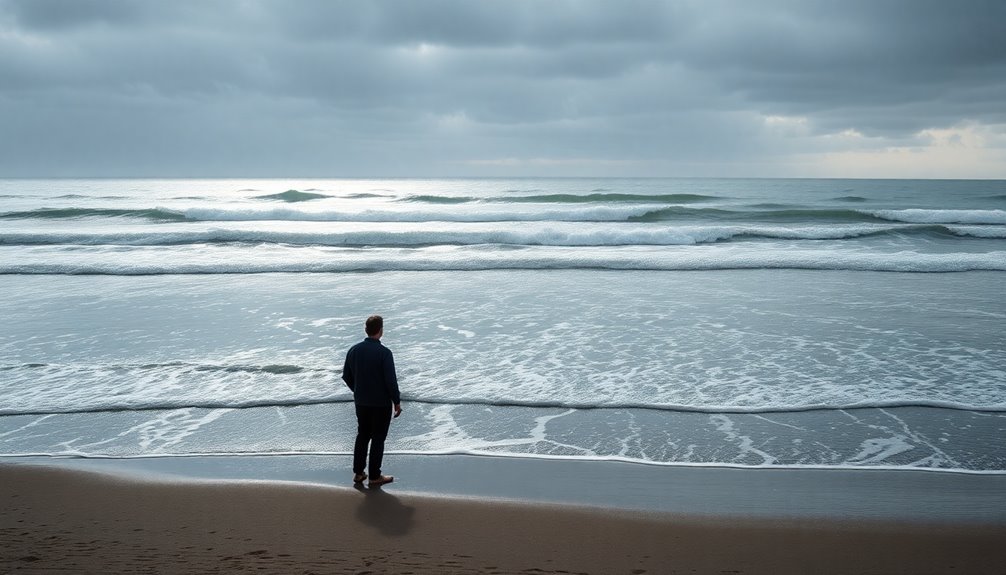
John Banville's writing style in "The Sea" captivates with its lyrical and poetic quality, drawing readers into a vivid world of sensory experiences. His narrative weaves through the complexities of grief, utilizing a non-linear structure that alternates between Max Morden's present and his childhood memories. This approach not only enhances the storytelling but also invites you to explore the depths of loss.
Key elements of Banville's style include:
- Lyrical prose: His rich, descriptive language evokes emotion and atmosphere.
- Interior monologue: You gain insight into Max's psyche, understanding his inner turmoil.
- Unreliable narration: The narrative's ambiguity challenges your perceptions and interpretations.
- Vivid imagery: Alliterative phrases create a painterly effect, immersing you in the seaside setting.
- Character exploration: Banville intricately develops characters, revealing their complexities and philosophical themes.
Through these techniques, Banville not only captures the essence of loss but also invites you to reflect on your own emotional experiences. His ability to blend these elements makes "The Sea" a haunting and memorable read.
Philosophical Reflections in the Novel
Delving into the depths of "The Sea," you find that the novel grapples with existential themes that resonate on multiple levels. The protagonist, Max Morden, navigates the complexities of existence, confronting the weight of memory and its role in shaping identity.
Through his reflections, you see how memories define not just who he is, but also how they anchor him amidst the chaos of loss and grief.
Banville introduces the notion of a "second death," emphasizing that losing one's memories can be as devastating as physical death itself. This concept invites you to reflect on mortality and the fleeting nature of life.
As Max wrestles with his internal struggles, he faces moral dilemmas tied to intimacy and the quest for understanding in the wake of profound loss.
Throughout the novel, nostalgia permeates every page, reminding you that the past is both a comfort and a burden.
The philosophical reflections in "The Sea" challenge you to contemplate the intricacies of human emotions and the profound implications of living in a world marked by absence, ultimately enriching your understanding of what it means to be human.
Emotional Impact on Readers
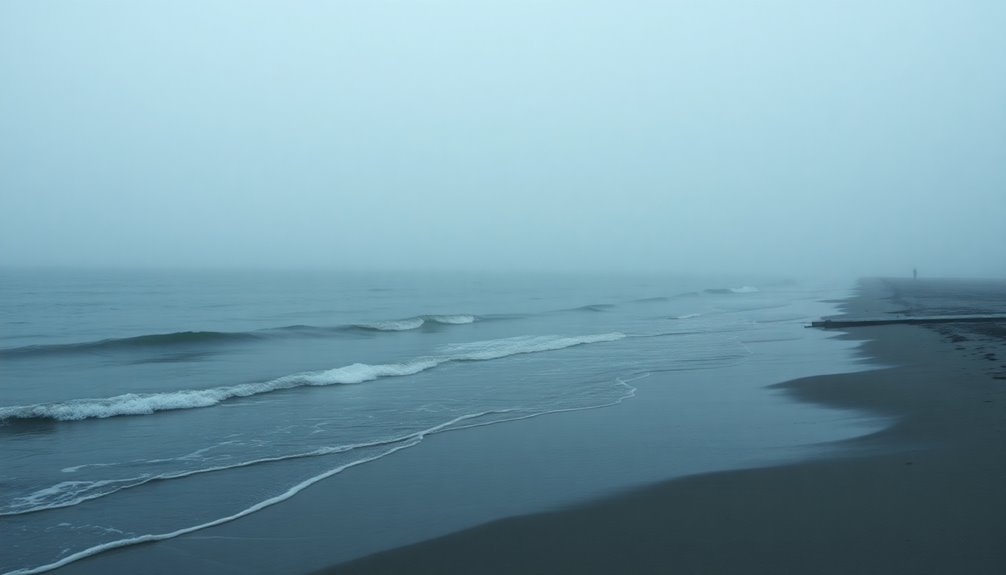
The emotional impact of "The Sea" on readers is profound and far-reaching, drawing many into a deep engagement with its themes of grief and memory. As you immerse yourself in Max Morden's story, you might find yourself reflecting on your own experiences of loss, fostering a personal connection that resonates long after you turn the last page.
Here are some ways the novel evokes such strong emotional responses:
- Introspection: Max's journey prompts you to examine your own feelings and memories.
- Nostalgia: The interplay of past and present invites contemplation of your own history.
- Melancholy: Banville's lyrical prose encapsulates the beauty of sorrow, enhancing your emotional experience.
- Mortality: The narrative confronts you with the realities of existence, making you ponder life's fragility.
- Grief: His portrayal of loss resonates deeply, allowing you to connect with your own emotions.
The Role of Nostalgia
Nostalgia weaves through "The Sea," shaping Max Morden's reflections on his childhood and the profound connections he formed with the Grace family. As you explore Max's memories, you experience the bittersweet nature of nostalgia, where cherished moments coexist with the pain of loss. The seaside setting evokes sensory experiences that trigger vivid recollections, particularly related to scent, allowing you to feel the weight of his grief.
Banville's lyrical prose captures how these memories serve as a sanctuary, yet they also remind Max of what he's lost. Each reflection reveals how nostalgia can be both comforting and melancholic, illustrating the complexities of human experience. You understand that these memories are fluid, shifting between joy and sorrow, as Max navigates his present turmoil.
Through Max's journey, you realize that nostalgia isn't merely a longing for the past; it's a lens through which he grapples with his grief. The interplay of memory and loss highlights how deeply intertwined they are, leaving you contemplating your own experiences.
In "The Sea," nostalgia becomes a haunting reminder that while the past may be gone, its echoes linger, shaping who we're today.
Legacy of "The Sea"
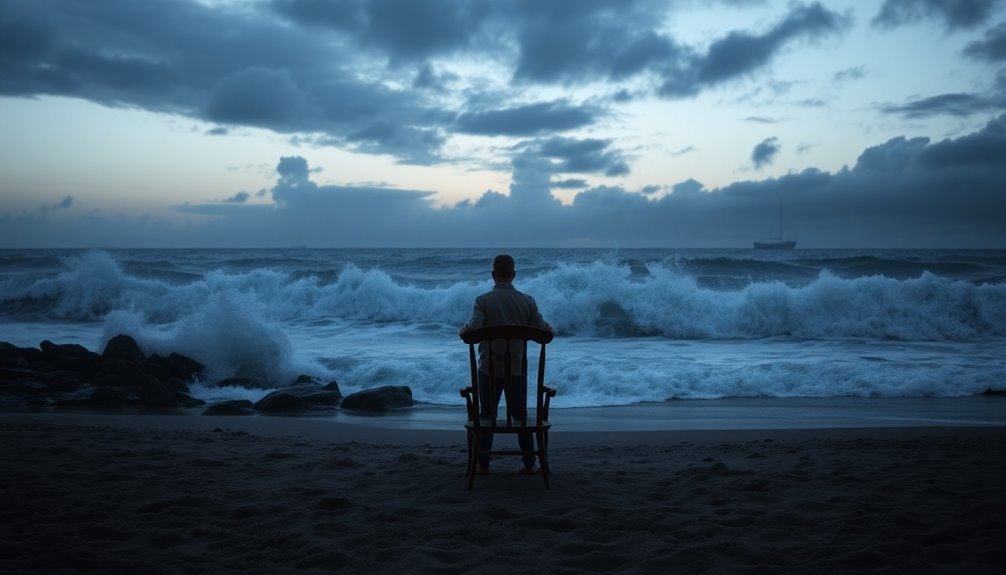
While exploring the impact of "The Sea," you can't help but notice its lasting legacy in contemporary literature. Winning the prestigious 2005 Man Booker Prize solidified John Banville's position as a significant figure in literary fiction. This novel, often regarded as his best work, has become a cornerstone for readers interested in deep thematic exploration and haunting hints of loss.
Here are a few aspects of its legacy:
- Recognition: Received the Novel of the Year award from the Irish Book Awards in 2006.
- Widespread Appeal: Over 100,000 ratings on Goodreads showcase its broad readership.
- Influential Style: Critics praise its lyrical prose, drawing comparisons to Proust and Henry James.
- Genre Versatility: Classifications include experimental literary fiction and magical realism, highlighting Banville's innovative narrative style.
- Cultural Impact: Continues to inspire discussions around themes of memory, grief, and identity.
In essence, "The Sea" isn't just a novel; it's a haunting reflection on loss that resonates with readers and writers alike, securing its place in literary history.
Conclusion
In "The Sea," John Banville crafts a poignant exploration of loss that resonates deeply with readers. You can't help but wonder: how do our memories shape our identities as we navigate grief? Through Max Morden's journey, you're invited to confront your own past, reflecting on the beauty and pain intertwined in every moment. The novel's haunting imagery and profound themes linger long after the last page, ensuring its legacy as a timeless meditation on the human experience.

